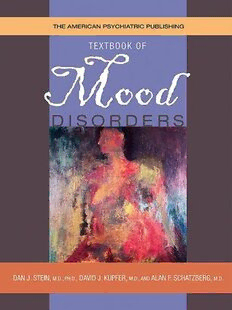
The American Psychiatric Publishing Textbook of Mood Disorders PDF
793 Pages·2005·13.592 MB·English
Most books are stored in the elastic cloud where traffic is expensive. For this reason, we have a limit on daily download.
Preview The American Psychiatric Publishing Textbook of Mood Disorders
Description:
Psychiatrists and other mental health care and medical professionals can now turn to a truly authoritative, up-to-date reference for current information about mood disorders. The American Psychiatric Publishing Textbook of Mood DisordersAincluding a wealth of illustrations, tables and referencesApresents the state of the art in diagnosis, psychobiology, pharmacotherapy, and psychotherapy across the vast spectrum of mood disorders: Symptomatology and Epidemiology: -Historical aspects and social underpinnings of mood disorders. -Classification and rating scales. -Global burden (the high costs of depression and bipolar disorder). Pathogenesis: -Neurochemistry and psychoneuroendocrinology. -Cognitive processing models (experimental cognitive research). -Evolutionary explanations (the normal role of low mood in disengaging individuals from goals they cannot reach). Methods of Investigation: -Anatomical pathology (strengths and limitations of human postmortem studies). -Molecular and cellular neurobiology of severe mood disorders (abnormalities in the regulation of signaling). -Genetics of bipolar and unipolar disorders. Types of Mood Disorder: -Psychotic depression (distinct from nonpsychotic depression in presenting features, biology, familial transmission, course, and response to treatment). -Seasonal affective disorder (use of light therapy in SADS and also in other depression). -Secondary depression with medical illness (calling for large-scale studies to gauge treatment efficacy). -Major depression seen in primary care (as prevalent as hypertension). -Substance abuse (a long-standing source of controversy). -Sleep disorders (risk factors for the new onset of depression). Treatments: -Pharmacotherapy (including tricyclics and tetracyclics, MAOIs, SSRIs and newer antidepressants, lithium and other mood stabilizers, antipsychotics, hormonal interventions, and augmentation strategies). -Brain stimulation techniques (such as ECT, transcranial magnetic stimulation, and vagus nerve and deep brain stimulation). -Psychotherapies (cognitive-behavioral, interpersonal, and psychoanalytic/psychodynamic). Pertinent Factors: -Personality (the need for further study of the degree and the etiologic nature of relationships between specific traits or disorders and major depression). -Culture (suggesting a model of cultural consultation using multilingual, multicultural clinicians and culture brokers to supplement routine care). -Gender (women being about twice as likely as men to have mood disorders) -Age (pediatric and geriatric depression and suicidality). Offering a fascinating synthesis of the multifaceted field of mood disorders, the richly informative American Psychiatric Publishing Textbook of Mood Disorders will prove invaluable for psychiatric and medical practitioners, educators, students, and residents interested in the latest breakthroughs in the diagnosis, treatment, and management of mood disorders.
See more
The list of books you might like
Most books are stored in the elastic cloud where traffic is expensive. For this reason, we have a limit on daily download.
